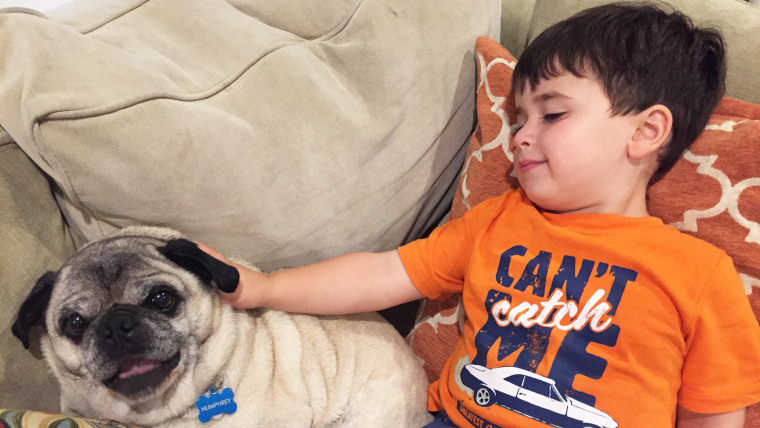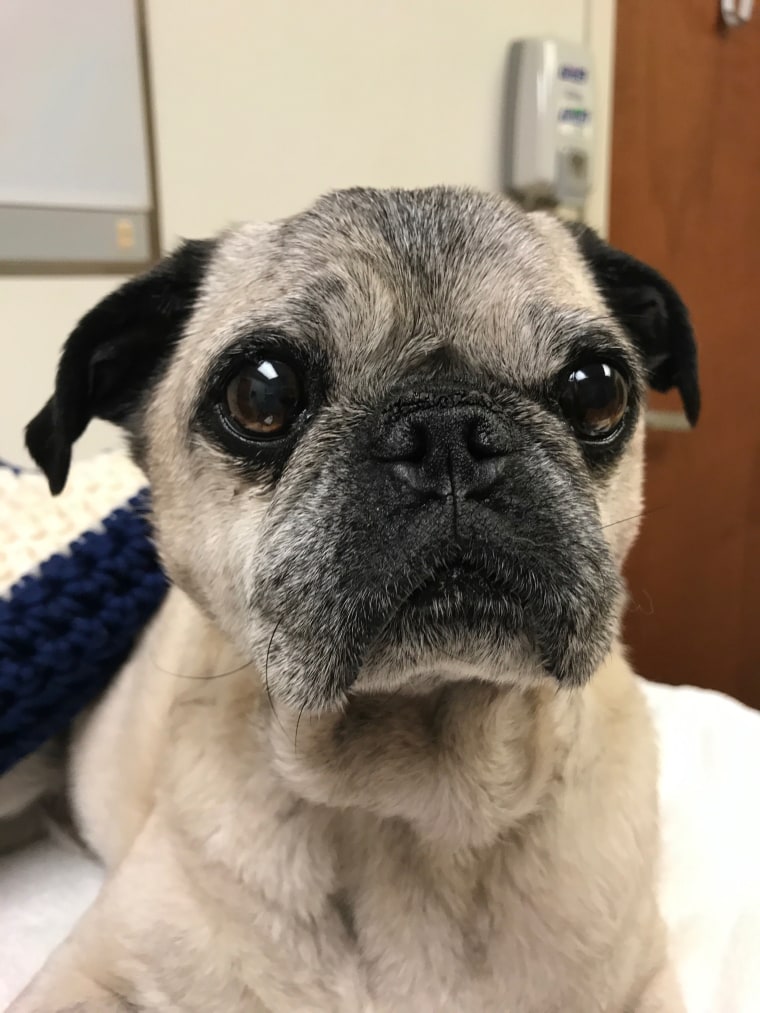Parenthood is full of tough conversations, but for my wife and me, one stands out from the pack: telling our oldest son his dog had died.
Our son, Liam, has been lucky. In his nearly four years on Earth he’s been blissfully unaware of death as a concept or a reality. He understands flowers “wilt and die,” but he doesn’t really get it. He picks flowers with reckless abandon, and has been known to accidentally squish a worm or two when he gets too enthusiastic.
Another pet, a goldfish, died soon after it entered our lives, but Liam was only two and never inquired as to its whereabouts in the weeks and months after its departure.

All of this is typical. Liam (thankfully) isn’t old enough to grasp the permanence of death.
Never miss a parenting story with TODAY's newsletters! Sign up here
And that’s what made this conversation even tougher. We didn’t just need to tell Liam that his dog wouldn’t be running in the park with him anymore. We also needed to make the first pinprick in our son’s bubble of innocence.
Looking back on the conversation, here’s what I wish we knew before we spoke with Liam:
1. How much he’d understand
Even though we hadn’t told Liam just how ill Humphrey was — he’d been battling lymphoma and its associated maladies for a year — he could sense something was up. He knew Humphrey was going to the vet frequently and that he “didn’t feel well.”
Liam was gentler with Humphrey in the final weeks and months, and often parroted the language adults used around him. “Oh, poor Humphrey,” was a common refrain Liam shared. He noticed the decrease in Humphrey’s appetite and the increase in Humphrey’s accidents, and was often our helper when it came time to clean up.

When we spoke with Liam he understood more than we expected. He knew he couldn’t say goodbye to Humphrey, knew he wasn’t well, and it made him sad. I’m still not sure how I held it together when he said he wanted to play with Humphrey “one more time.”
2. How little he’d understand
At the same time, Liam had trouble grasping a lot of what we told him.
We began our conversation with a very blunt question, the intention of which was to assess Liam’s understanding of the situation.
“Liam, Humphrey died today. Do you know what that means,” my wife, Tara, asked him.
Liam thought for a moment or two, and looked puzzled. He wrinkled his nose, thought some more, and said: “Yes, Humphrey....pooped?”
Oh boy.
We knew we had more to explain, so we dove right in.
Since Liam knew Humphrey had been visiting the vet quite often, we told him there was something seriously wrong inside Humphrey’s body — a disease — and while doctors spent a long time trying to fix him, there wasn’t anything they could do and his body was broken. (More on our choice of words below).
We got Liam to a point where he understood Humphrey wasn’t returning home, but he didn’t fully grasp the physical change that occurred. To put it bluntly: He didn’t understand that Humphrey’s body remained at the vet, but Humphrey, the sweet dog he knew, was gone.
“Is Humphrey staying at the vet? Oh, he’s sleeping there tonight? That’s silly! Can we visit him tomorrow?”
Searching for a comparison he’d grasp, we compared Humphrey’s illness to a toy that’s run out of batteries. He couldn’t fully grasp this either, and responded with “Well then you can just change the batteries! Can we change Humphrey’s batteries?” We told him we can change the batteries on toys, but unfortunately we can’t do that for pets, and they don’t live as long as we’d like.
3. How much words matter
Liam, like most kids his age, has his fair share of fears and anxieties. They come from unexpected places: bits of conversations he overhears, experiences that didn’t go as planned, even promises made by caregivers.
We knew we needed to choose our words carefully. We avoided the phrase “put to sleep,” and avoided all mention of the word “sickness.”
Beyond feeling incredibly dated and off-color, “put to sleep” has the potential to conjure some terrible images for children. Liam isn’t a bad sleeper, but like many kids, has his issues going to bed. We certainly did not want to add assuaging the fear of death to his evening routine.
“Sickness,” which he associates with the sniffles he gets during the winter, was another important one to avoid. We wanted Liam to know he — or anyone else he loves — could get sick, without the fear of dying. A disease was identified as something else, something beyond, something requiring the intervention of hospitals and doctors with specialties. We wanted to be sure not to lie to him about anything, and our hope is that he will not be confronted with a disease anytime soon.
4. How much emotion can convey
Actions speak just as loud as words for kids, and when Liam noticed Tara and me struggling with our emotions during the conversation, this was his cue to get sad. From the moment we came home from the vet and interrupted his Curious George video with “we need to talk to you about something,” Liam became much more serious than he usually is. Even at his young age, he could tell something was up.
We realized he’s not only still learning what death is, but how to feel about it, and we wanted him to see the full range of reaction, honestly. We want him to know that we are sad and that it’s okay if he is sad, also.
5. How fast the conversation may be
The prep for the conversation took a while. We mulled word choice, flow and speaker order for what seemed like hours. We read up on the best way to talk about pets dying with preschoolers. In the end, the conversation lasted no longer than five minutes.
And Liam was fine. He popped off his bed with the same exuberance he displays every day, none the worse for wear, and went back to watching Curious George with his little brother and his grandma and grandpa.
6. How the conversation will linger even if it is initially quick
Even though Liam did not mention Humphrey for the rest of that day, the next morning he woke up and asked about him, since he wasn’t in his usual resting place.
“Where’s Humphrey?” Tara was forced to have a miniature version of the conversation again, and this time Liam was sad, and spent part of the morning lying in bed looking at a picture of Humphrey. With kids as young as Liam, who don’t fully understand what is going on, they need reminders and are constantly going through a range of emotions.
Still, he bounced back and went off to camp a happy boy.
One of the hardest parts of Humphrey’s illness was our anxiety about how Liam would handle it.
I now know he will be fine.
And we will be too, in time.